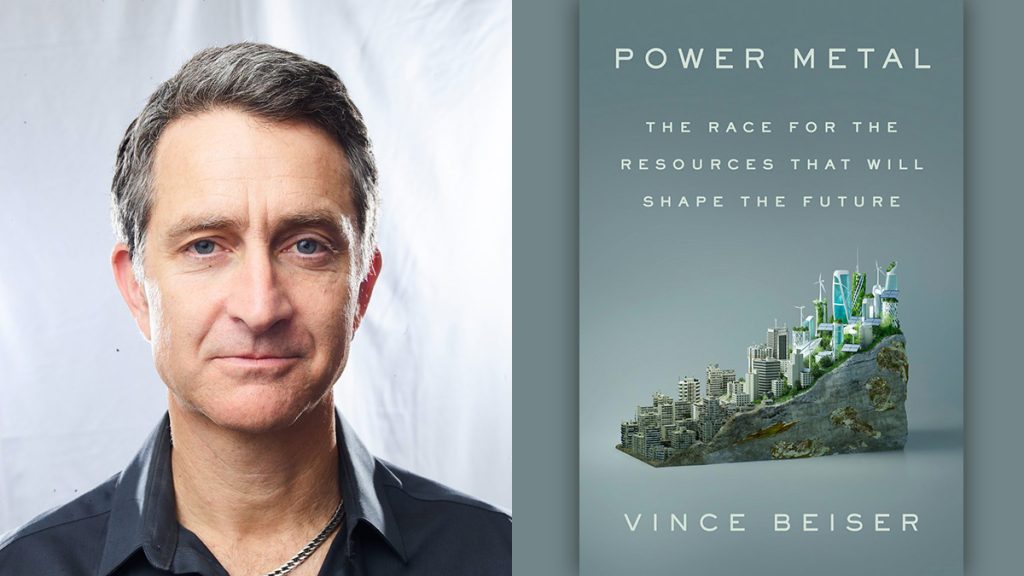Vince Beiser to deliver Smith/Patterson Lecture on digging into environmental issues with no easy answers

COLUMBIA, Mo. (April 15, 2025) — Vince Beiser, a veteran journalist and author of “Power Metal: The Race for the Resources That Will Shape the Future,” will deliver the Missouri School of Journalism’s Smith/Patterson Science Journalism Lecture on Thursday, April 17. The lecture — which is free and open to the public — will begin at 6 p.m. in Smith Forum at the Reynolds Journalism Institute, with free pizza available starting at 5:30 p.m.
Beiser will discuss “Power Metal,” his second book on a large-scale environmental issue after 2018’s “The World in a Grain,” which covered the implications of the world’s diminishing supply of sand. His newest book examines how modern technology and renewable energy have skyrocketed the demand for critical metals like lithium, cobalt and copper, leading to unfortunate consequences for the planet and its people.
“Vince is an incredible journalist who has reported from all around the world and in several mediums,” said Sara Shipley Hiles, director of the Smith/Patterson program. “Our faculty and students can learn a lot from him.”
Beiser hopes to instill in students and other attendees the importance of a nuanced perspective when it comes to writing about environmental issues. In the case of “Power Metal,” that nuance revolves around portraying both the positive and negative aspects of green technologies that can ease the burden of one crisis while worsening another.
“We’re getting these metals by bulldozing rainforests in Indonesia, we’re getting them from child laborers in Congo. To get these metals, warlords are getting rich and rivers are getting poisoned.”
Vince Beiser, author of Power Metal: The Race for the Resources That Will Shape the Future
“There’s a great paradox here, which is that in order to stave off the biggest environmental problem that we face — climate change — we are creating other environmental problems,” Beiser said. “We’re getting these metals by bulldozing rainforests in Indonesia, we’re getting them from child laborers in Congo. To get these metals, warlords are getting rich and rivers are getting poisoned.”
But despite the pressures of these competing emergencies, Beiser doesn’t want to project fatalism. The second half of his book focuses on potential solutions to the challenges posed by the demand for critical metals, highlighting the parallel races to not only find more of the metals but blunt the impact of harvesting them.
“I’ve been to so many places all over the world where people — whether they’re scientists or activists or entrepreneurs — are working on all kinds of ways to fix these problems,” Beiser said. “When you turn your gaze in that direction, you can get a lot of hope from that.”
Beiser added that he is excited to address students in particular, both during the lecture and in a journalism class earlier in the day. Some of the students in the class are reporting on critical minerals mining and processing in Missouri.
“I really like talking to students because they are just starting out,” he said. “They haven’t decided where they’re going to go or what they’re going to do, and getting the chance to maybe give them a little inspiration, a little direction, it really charges me up. That’s one of the things that keeps me going.”
Learn more about “Power Metal” here.
About the Smith/Patterson Lecture Series
The Smith/Patterson Science Journalism Fellowship and Lecture Series was established in 2008 by Missouri School of Journalism alumnus Russell G. Smith II and his wife, Gail, to honor Joye Patterson, Smith’s former professor and mentor. The program is also part of a partnership with the Pulitzer Center established in 2017 to enhance the School of Journalism’s emphasis on science, health and environmental journalism.
Updated: April 15, 2025